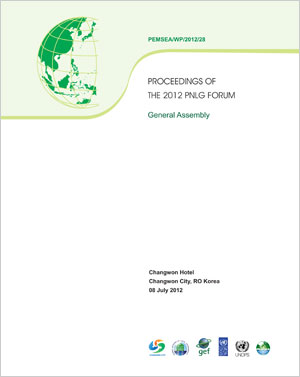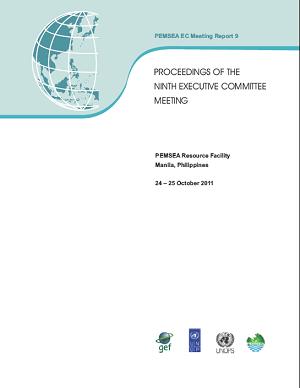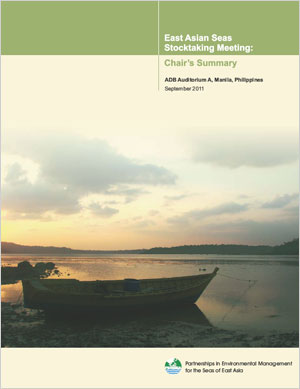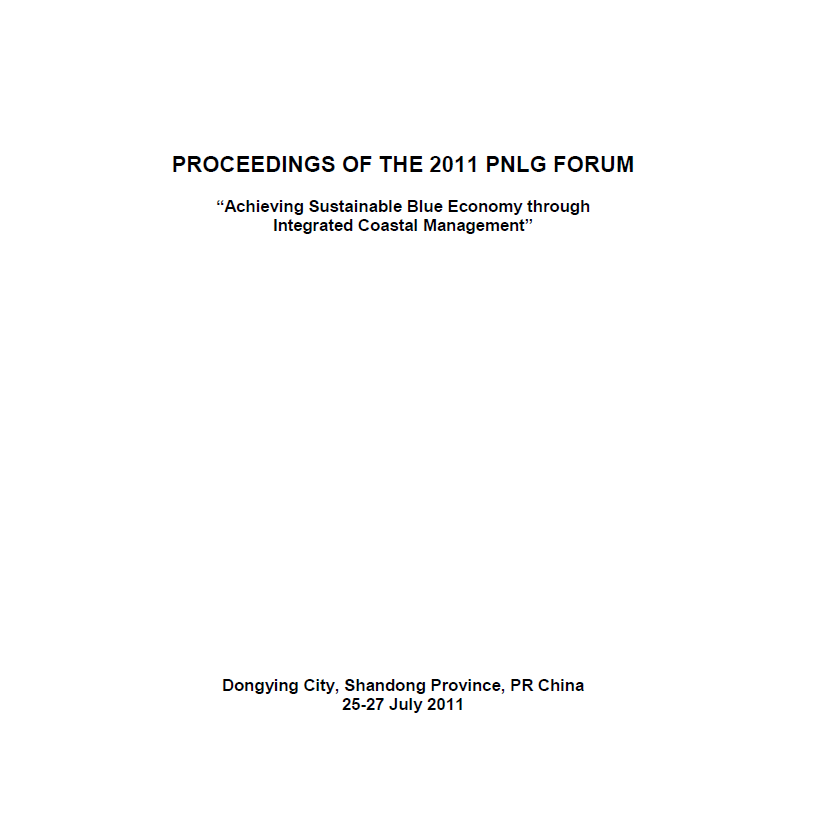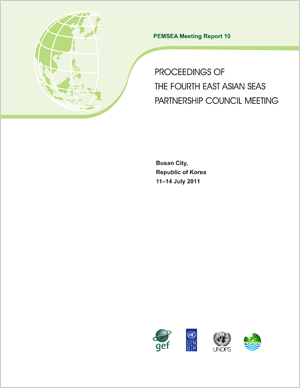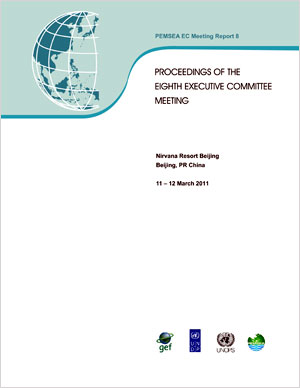| Document Number | Document Title |
|---|---|
| EC/11/DOC/01 | List of Documents |
| EC/11/DOC/02 | Annotated Agenda |
| EC/11/DOC/03 | PEMSEA Transformation: Sustainable Financing Road Map |
| EC/11/DOC/04 | PEMSEA Transformation: PRF Re-Engineering Plan and Road Map |
| EC/11/DOC/05 | PEMSEA Advocacy and Communications Road Map |
| EC/11/DOC/06 | PEMSEA Rules of Governance Road Map |
| EC/11/DOC/07 | Concept Note: Ministerial Declaration |
| EC/11/DOC/08 | Status Report on the East Asian Seas (EAS) Congress 2012 |
| EC/11/DOC/10 | PEMSEA Codes, Guidelines and Good Practices |

Breadcrumb
Proceedings of the 2012 PNLG Forum: General Assembly
The 2012 PEMSEA Network of Local Governments for Sustainable Coastal Development (PNLG) Forum General Assembly was held at the Changwon Hotel, Changwon City, Republic of Korea on 8 July 2012. The Changwon City Government hosted the forum. This publication summarizes the outcome of the forum.
Proceedings of the Tenth Executive Committee Meeting
The Tenth (10th) Executive Committee Meeting was held at the Oakwood Premier Joy-Nostalg Center, on 20 April 2012 and at the PEMSEA Resource Facility, Manila, Philippines, on 21 April 2012. The Meeting was attended by the EAS Partnership Council Chair, Dr. Chua Thia-Eng; Technical Session Chair, Mr. Hiroshi Terashima; Council Co-Chair Ambassador Mary Seet-Cheng; Intergovernmental Session Co-Chair Undersecretary Analiza Rebuelta-Teh; and Technical Session Co-Chair Prof. Chul-Hwan Koh. A representative from the Ocean Policy Research Foundation (OPRF) of Japan participated as an observer. The PEMSEA Resource Facility (PRF) served as the Secretariat for the meeting.
Document Number Document Title EC/12/DOC/01 List of Documents EC/12/DOC/02 Annotated Agenda EC/12/DOC/04 PEMSEA Council Chair’s Efforts to Promote and Support PEMSEA’s Concept and Activities in 2011 EC/12/DOC/06 Fourth Ministerial Forum: Draft Declaration and Status of Preparations EC/12/DOC/07 Summary Report on PEMSEA Governance and Transformation EC/12/REF/03 Rules Governing the Election by Consensus of Partnership Council Officers and Co-chairs
Proceedings of the Ninth Executive Committee Meeting
The Ninth (9th) Executive Committee Meeting was held at the PEMSEA Resource Facility, Manila, Philippines, from 24 to 25 October 2011. This publication summarizes the output of the meeting. The Meeting was attended by the EAS Partnership Council Chair, Dr. Chua Thia-Eng; Technical Session Chair, Mr. Hiroshi Terashima; Council Co-Chair Ambassador Mary Seet-Cheng; Intergovernmental Session Co-Chair Undersecretary Analiza Rebuelta-Teh; and Technical Session Co-Chair Prof. Chul-Hwan Koh. A representative from the Ocean Policy Research Foundation of Japan participated as an observer. The PEMSEA Resource Facility (PRF) served as the Secretariat for the meeting.
Background Paper for the East Asian Seas Stocktaking Meeting: Preparation of a Programmatic Approach for the Coordinated Sound Management and Development of the East Asia Seas Region
The Seas of East Asia (EAS) are bordered by China, Japan and the Korean Peninsula in the north and the Southeast Asian nations in the south. The region harbours a significant part of the world’s coral reefs and mangroves and also produces about 40 percent of the world’s fish catch and more than 80 percent of aquaculture. The human pressure on marine and coastal resources is very high with approximately 2 billion people living in the region. The EAS region encompasses a series of large marine ecosystems (LME), subregional seas and their coastal areas. This includes the Yellow Sea, the East China Sea, the South China Sea, Gulf of Thailand, the Sulu-Celebes Sea and the Indonesian Seas — six LMEs of great ecological and economic importance. The physical extent of each LME and its boundaries are based on four linked ecological, rather than political or economic, criteria: (1) bathymetry; (2) hydrography; (3) productivity; and (4) trophic relationships. Globally, the LMEs are centers of coastal ocean pollution and nutrient over-enrichment, habitat degradation (e.g., seagrasses, corals, and mangroves), overfishing, biodiversity loss, and climate change effects. This report is taking stock of results of GEF projects in these LMEs, including overlaps with two LMEs bordering Australia. Yellow Sea (LME #48) East China Sea (LME #47) South China Sea (LME #36) Gulf of Thailand (LME #35) Sulu-Celebes (Sulawesi) Sea (LME #37) Indonesian Sea (LME #38) North Australian Shelf (Arafura Sea, Gulf of Carpentaria) (LME #39) Northwest Australian Shelf (Timor Sea) (LME #45) The countries that border these LMEs are: Australia; Brunei; Cambodia; China; DPR Korea; Indonesia; Japan; Malaysia; Philippines; RO Korea; Singapore; Thailand; Timor-Leste; and Viet Nam.
East Asian Seas Stocktaking Meeting: Chair's Summary
The East Asian Seas Stocktaking Meeting was held at the Asian Development Bank (ADB) Auditorium A, Manila, Philippines from 28-29 October 2010. The ADB and Government of the Philippines through the Department of Environment and Natural Resources hosted the meeting. The objective of the meeting was to assess the status and identify the constraints to sustainable management of the regional seas, and to prioritize the interventions and the potential role of the GEF over the next 4 years (i.e., 2011 to 2014). The Stocktaking Meeting concluded the following: The Stocktaking Background Paper was well received and considered to be a good and useful document in the context of the stocktaking effort. It will undergo refinement based on inputs provided during the meeting. The refined paper will then be disseminated to GEF agencies, GEF Secretariat, participating countries and concerned regional organizations. Country ownership and country-drivenness to address transboundary issues in the Seas of East Asia have developed and strengthened over the years with GEF support, as evidenced by the development and adoption of the SDS-SEA and the YSLME and SCSLME SAPs with their associated national action plans as well as by the implementation of the pollution reduction investment fund. PEMSEA and the SDS-SEA, respectively, can provide a regional governance mechanism, framework and scope for integrated and collaborative planning, coordination, and monitoring and reporting of outputs and impacts of regional, subregional and national projects for sustainable management of the seas of East Asia, as well as to promote knowledge management and associated good practices. There are recognized needs for increased programmatic GEF investments in the EAS region according to a programmatic agenda covering: Knowledge-sharing, advocacy, communication, development and dissemination and good practices, and capacity development/training, awareness building and education; Thematic priorities including: the blue agenda with marine and coastal habitat and resource conservation and management (with an increase attention to fisheries resources); and the brown agenda: land-based sources of marine pollution. In addition, climate change adaptation is a cross-cutting priority to be mainstreamed in the two above thematic priorities. Scaling up of investments at the local and national levels in support of capital works identified and developed in coastal areas in the context of ICM, when possible, through linkages with the public and private sectors, using domestic and international finance; A shift from projects that have a planning focus to projects that promote good practices, implement agreed plans and result in desired on-the-ground changes. A programmatic agenda to scale up entails: Working across sectors and in several countries; Mobilizing resources programmatically within and across different sources of finance and different sectors; and Making effective and efficient use of available human and financial resources by increasing synergy and alignment. GEF agencies now need to work with countries to develop the regional and national projects using a programmatic approach for submission to GEF in order to support the regional implementation of SDS-SEA (final phase), the YSLME SAP and the SCSLME SAP as well as to scale up country-based actions along the lines of the identified thematic priorities.
Proceedings of the 2011 PNLG Forum
“Achieving Sustainable Blue Economy through Integrated Coastal Management”
Dongying City, Shandong Province, PR China, 25-27 July 2011
A. INTRODUCTION
i. The 2011 PEMSEA Network of Local Governments (PNLG) Forum was held at the Blue Horizon International Hotel, Dongying City, Shandong Province, PR China, from 26 to 27 July 2011. The Dongying Municipal Government hosted the Meeting with support from the State Oceanic Administration of China.
ii. The Forum was attended by representatives from the PNLG members, namely: Cambodia (Preah Sihanouk); China (Dongying; Fangchenggang; Haikou; Laoting; Liangyungang; Quanzhou; Xiamen); Indonesia (Bali Province, Denpasar City; Gianyar Regency; Karangasem Regency; Tabanan Regency; Jakarta Province and Sukabumi Regency); Philippines (Bataan Province and Guimaras Province); RO Korea (Changwon City ); Thailand (Chonburi), and Vietnam (Danang and Thua Thien Hue).
iii. Representatives from various local governments and various institutions served as observers, including:Cambodia (Kep Province); Indonesia (Jembrana Regency; West Java Province); Lao PDR (Saravane; Champasak); China (Panjin Ocean and Fishery Bureau of China; Qingdao Ocean and Fishery Bureau; Yangjiang Ocean and Fishery Bureau; Haiyang Municipal Government; Haiyang Ocean and Fishery Bureau; North China Sea Branch of SOA; Shandong Provincial Department of Oceanic and Fishery; RO Korea (Kyungnam University; Korea Ocean Research and Development Institute); and Timor Leste (Ministry of Agriculture and Fisheries).
iv. The following served as resource speakers for the Forum: Dr. Chua Thia-Eng, Chair, EAS Partnership Council; Mr. Xue Rongjian, Deputy Director, Dongying Municipality Blue Economy Management Office, China; Mr. Lee Tsen Yang, National Parks Board, Singapore; Mr. Wang Shou Qiang, Representative of Dongying ICM Project, Dongying Municipal Government; Dr. Kee-Hyung Hwang, Research Fellow and Director, Korea Maritime Institute; Dr. Zhang Zhaohui, Associate Professor, First Institute of Oceanography, State Oceanic Administration, China.
v. The PNLG Secretariat in Xiamen and PEMSEA Resource Facility (PRF) served as the Secretariat for the Meeting, while the Dongying Ocean and Fishery Bureau served as the local secretariat.
vi. The meeting agenda and full list of participants are attached as Annex 1 and 2.
Proceedings of the Sixth Twinning Workshop on Integrated River Basin and Coastal Area Management (IRBCAM): Total Allowable Pollutant Load Allocation in River Basins and Coastal Areas of East Asia
The theme of the Sixth Twinning Workshop on Integrated River Basin and Coastal Area Management (IRBCAM) was "Total Allowable Pollutant Load Allocation in River Basins and Coastal Areas of East Asia." This publication summarizes the outcome of the workshop. The theme of the Sixth Twinning Workshop on Integrated River Basin and Coastal Area Management (IRBCAM) was "Total Allowable Pollutant Load Allocation in River Basins and Coastal Areas of East Asia." It aimed to share good practices and experiences in planning, implementing and evaluating total allowable pollutant reduction programs in integrated river basin and coastal area management programs of Bohai Sea (PR China), Manila Bay (Philippines), Jakarta Bay (Indonesia), Jiulong River (PR China) and Masan-Chinhae Bay (RO Korea). The workshop was held at the Xinghai Golf Hotel, Dalian, PR China, from 18–20 May 2011. The workshop was co-organized by the State Oceanic Administration (PR China); Ministry of Land, Transport and Maritime Affairs (RO Korea); Korea Maritime Institute (RO Korea) and PEMSEA. The Workshop included participants from Democratic People's Republic of Korea, Indonesia, Japan, People's Republic of China, Philippines, and the Republic of Korea.
Proceedings of the Fourth EAS Partnership Council Meeting
The Fourth East Asian Seas Partnership Council Meeting was held at the Novotel Ambassador Busan Hotel, Busan City, Republic of Korea, from 11 to 14 July 2011. The Ministry of Land, Transport and Maritime Affairs of RO Korea hosted the Meeting and the City Government of Busan and the Korea Maritime Institute co-organized the Meeting. The Meeting was attended by representatives from ten PEMSEA Country Partners, namely: Cambodia; Indonesia; Japan; Lao PDR; PR China; Philippines; RO Korea; Singapore; Timor-Leste and Vietnam. A representative from Thailand was present as an observer. Representatives from nine Non-Country Partners were in attendance, namely: Coastal Management Center (CMC); International Ocean Institute (IOI); Korea Maritime Institute (KMI); Northwest Pacific Action Plan of UNEP (NOWPAP); Ocean Policy Research Foundation (OPRF); Oil Spill Response Limited (Oil Spill Response); Plymouth Marine Laboratory (PML); UNDP/GEF Yellow Sea Project (YSLME); and UNEP GPA. Representatives from the United Nations Development Programme (UNDP) Manila and the UNDP Regional Centre in Bangkok were present on behalf of the Implementing Agency and the Global Environment Facility (GEF). Representatives from the Korea Marine Environment Management Corporation (KOEM) and the Changwon City Government of RO Korea served as observers. The PEMSEA Resource Facility served as the Secretariat for the Meeting.
Document Number Document Title PC/11/DOC/01 List of Documents PC/11/DOC/03 Agenda PC/11/DOC/04 Annotated Agenda PC/11/DOC/05 Implementation Status of Major Recommendations and Decisions of the 3rd EAS Partnership Council Meeting, the 7th and 8th Executive Committee Meetings and the EAS Stocktaking Meeting PC/11/DOC/06 Report of the Council Chair PC/11/DOC/07 PEMSEA Accomplishment Report 2010-2011 PC/11/DOC/08 EC Structure and Turnover Mechanism PC/11/DOC/09 Election of EC Co-Chairs PC/11/DOC/10 PEMSEA Transformation: Draft 5-year SDS-SEA Implementation Plan PC/11/DOC/11a PEMSEA Resource Facility (PRF) Re-engineering Plan PC/11/DOC/11b PEMSEA Financial Sustainability Plan PC/11/DOC/11c Draft PEMSEA Advocacy and Communication Plan PC/11/DOC/12 PEMSEA Codes, Guidelines and Good Practices PC/11/DOC/13 Draft Framework Programme for the East Asian Seas Congress 2012 PC/11/DOC/14 Adoption of the PEMSEA Rules of Governance and the PEMSEA Transformation Plans
(Document available upon request)PC/11/DOC/15 Project Framework Document: "Platform for the Large Marine Ecosystems of East Asia - Scaling up through Country Partnership" and PEMSEA Medium-Size Project on Knowledge Sharing
(Document available upon request)PC/11/DOC/17 Draft Framework Programme for the Fourth Ministerial Forum
(Document available upon request)
Proceedings of the Eighth Executive Committee Meeting
The Eighth Executive Committee Meeting was held at the Nirvana Resort, Beijing, People's Republic of China, from 11 to 12 March 2011. The Meeting was attended by the EAS Partnership Council Chair, Dr. Chua Thia- Eng, Intergovernmental Session Chair, Dr. Li Haiqing, and Technical Session Chair, Mr. Hiroshi Terashima. Representatives from the State Oceanic Administration of China and Ocean Policy Research Foundation of Japan participated as observers. The PEMSEA Resource Facility (PRF) served as the Secretariat for the meeting.
Document Number Document Title EC/11/DOC/01 List of Documents EC/11/DOC/02 Agenda EC/11/DOC/03 Annotated Agenda EC/11/DOC/04 PEMSEA Transformation: SDS-SEA Implementation Plan 2011-2015 EC/11/DOC/05 PEMSEA Transformation: Draft PRF Re-Engineering Plan EC/11/DOC/06 PEMSEA Financial Sustainability Plan 2011-2015 EC/11/DOC/07 Draft PEMSEA Advocacy and Communication Plan 2011-2015 EC/11/DOC/08 PEMSEA Rules of Governance EC/11/DOC/08 & 09 PEMSEA Governance EC/11/DOC/09 Proposed EC Structure and Turnover Mechanism EC/11/DOC/10 PEMSEA Financial Reporting Templates EC/11/DOC/11 PEMSEA Codes, Guidelines and Good Practices: PSHEM Code EC/11/DOC/12 East Asian Seas (EAS) Congress 2012 and Fourth Ministerial Forum
